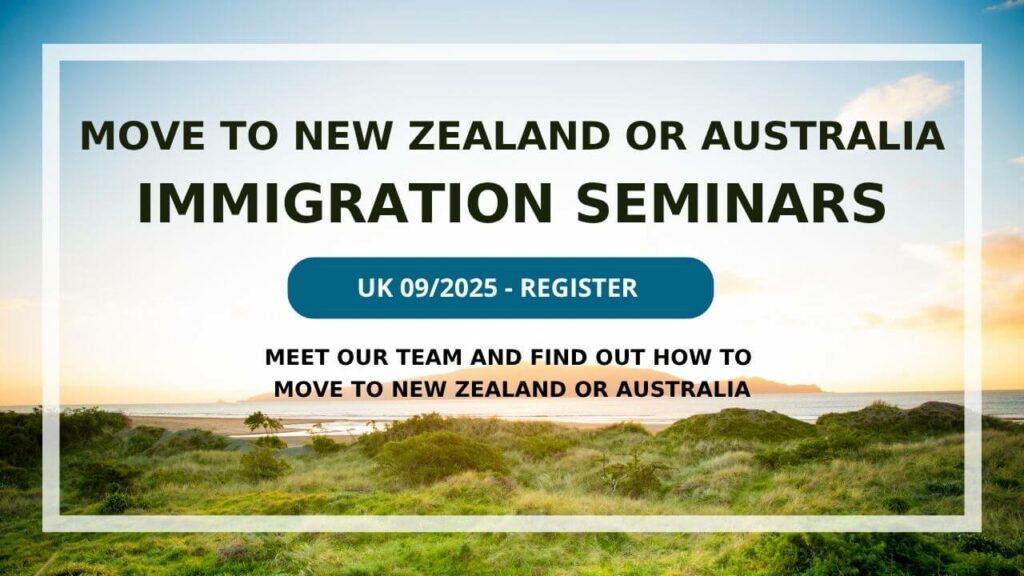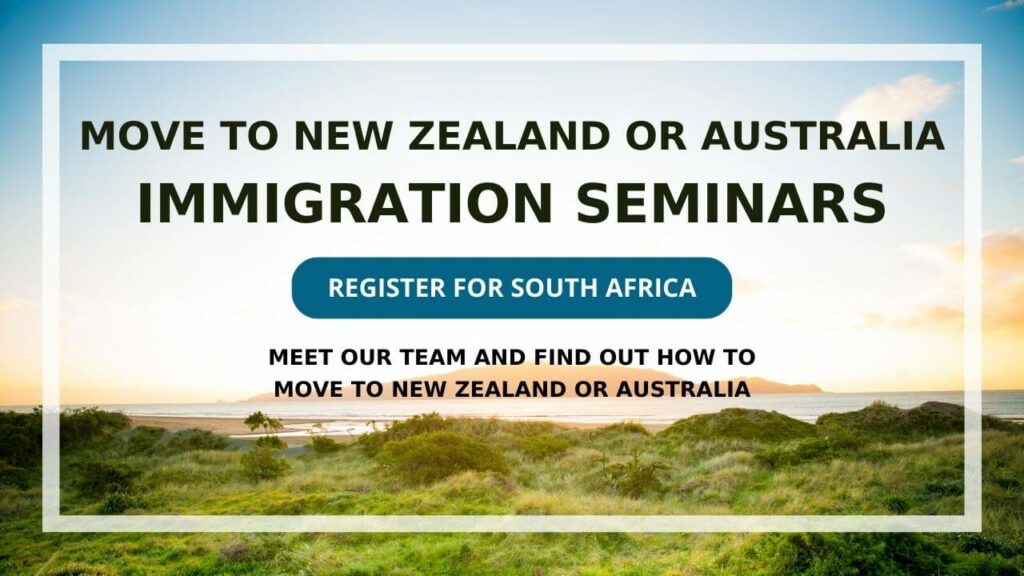Immigration New Zealand has released important changes that affect Accredited Employers and their migrant workers.
Quick links to changes
- Additional declarations and compliance checks
- Franchisee accreditation
- Changes to job checks
- Changes to AEWV
This article discusses changes for employers. Click here for a summary of changes for work visa holders.
WATCH OUR ADVISERS DETAIL THE CHANGES IN THIS WEBINAR
What changes for Accredited Employers?
There are now more requirements at the accreditation stage and during the accreditation period and this applies to all employers who are accredited or re-accredited from 7 April 2024.
Additional declarations and compliance checks
Ensuring a candidate meets competency requirements
The employer must now “take reasonable steps to ensure an applicant meets qualification and skill requirements” aka “minimum skill threshold” and that an applicant is suitably qualified to do the job offered to be approved employer accreditation.
This includes:
- meeting the minimum skills threshold (i.e. 3 years relevant work experience or Level 4 or above relevant qualification); and
- is suitably qualified to do the job offered as set out in the employer’s Job Check application
Reasonable steps taken by the employer to ensure an applicant meets the minimum skills threshold must include one or more of the below:
- sighting evidence of relevant work experience (i.e. documents not written by the person themselves) such as a work reference, payslips, tax certificate, certificate of employment; or
- sighting a qualification certificate awarded to the person that is a Bachelor’s degree or higher specifying the qualification type and awarding institution; or
- sighting a relevant qualification certificate awarded to the person specifying the qualification type and awarding institution that they reasonably believe to be at least NZQCF Level 4.
An employer is considered to have taken reasonable steps as required above by the minimum skills threshold if:
- the occupation offered is on the Green List, and the employer has ensured that the worker meets the Green List requirements for their occupation; or
- the proposed remuneration for the employment is twice the median wage or higher, and the employer has carried out one or more of the steps outlined below to ensure they are suitably qualified to do the job offered (employers are not required to take the steps outlined above to ensure the minimum skills threshold is met).
Reasonable steps taken by the employer to ensure an applicant is suitably qualified to do the job offered must include one or more of the requirements above under the minimum skills threshold OR one or more of the below:
- requiring a practical test of the person; or
- requiring the person to demonstrate their knowledge through a job interview; or
- sighting evidence that the person holds required occupational registration for the job offered.
If an employer is using an agent or organisation to recruit on their behalf, the employer is responsible for ensuring the reasonable steps above are taken.
The employer is also asked to keep accurate and complete records of reasonable steps taken by the employer, agent, or organisation recruiting on their behalf.
Online employer modules
Everyone who makes recruitment decisions “about an Accredited Employer work visa holder or applicant” within the employer’s organisation must also now complete Employment New Zealand’s online employer modules once within every accreditation period.
Requirement to employ migrants for at least 30 hours per week
AEWVs will be subject to the condition that a visa holder must be employed full time, allowing INZ to revoke an employer’s accreditation if they do not provide at least 30 hours work per week to those on an AEWV [AEWV condition and accreditation standard].
Advising INZ when an AEWV ends
The employer must now advise INZ within 10 working days if an AEWV holder’s employment ends more than a month before their visa expires.
The obligation to inform INZ if an AEWV ends is an accreditation requirement that will take effect at the point the employer is accredited (or has accreditation renewed or updated) while these requirements are in place.
An employer’s accreditation renewal application may be declined if an employer has failed to advise INZ of any within the required timeframe.
Franchisee accreditation changing
Franchisee accreditation will end sometime in 2024. Franchisee employers will be able to apply for standard, high-volume, or triangular employment accreditation, depending on their circumstances.
What changes apply to Job Checks?
The employer must agree to take reasonable steps to ensure that any Accredited Employer work visa applicant who applies on the basis of the Job Check is both suitably qualified to do the job offered and meets the minimum skills threshold.
ANZSCO to determine occupation and skill level of the role
An immigration officer will now assess the job offered to determine the occupation and skill level of the role as set out in the ANZSCO and may make a substantial match assessment.
Similar to previous Essential Skills policy and previous SMC policy, to be considered a substantial match to an occupation, the tasks relevant to the ANZSCO occupation description must comprise most of the proposed role.
When determining the occupation and skill level of the proposed employment, an immigration officer may also consider:
- the circumstances of the employer, including the scope and scale of the employer’s organisation and operation (the size of the operation, the number of staff and managers, and whether management functions are centralised at a head office or undertaken by other managers); and
- the qualifications and work experience required for the job; and
the remuneration offered.
Additional advertising requirements
Evidence of adverting must be listed for at least 14 calendar days for ANZSCO skill level 1 to 3 roles, and a minimum of 21 calendar days for ANZSCO skill level 4 and 5 roles.
Engagement with WINZ for ANZSCO 4 and 5 roles
Employers must now also engage with Work and Income (WINZ) if supporting ANZSCO skill level 4 and 5 roles (which is independent of the advertising conducted by the employer through external channels and regardless of the engagement with WINZ).
Employers must provide evidence of their engagement with WINZ in the form of confirmation from WINZ that either:
- the employer listed the role with Work and Income for 21 calendar days and the number of matched job seekers; or
- WINZ have no viable candidates for the role and therefore have exempt the employer from listing the role.
Despite the first option above, WINZ my determine that there are no viable candidates and may exempt the employer from listing the roll for the full 21 calendar days.
The proposed terms and conditions provided to WINZ as part of their listing must also be consistent with the content of the external advertising undertaken.
Additional declarations
As part of providing evidence that the labour market test is met, employers must declare about whether they found any suitable and available New Zealand workers for the job, and in the case of an ANZSCO skill level 4 or 5 role, a declaration from the employer that they did not find any suitable and available New Zealand workers for the job, along with a declaration about the reason(s) the New Zealand candidate(s) who applied for the role (if any), was or were not suitable or available.
If an employer indicates that there were suitable New Zealanders available (who met the definition of suitable and available as below), the Job Check will be declined.
A person is considered to be a 'suitable and available New Zealand worker’ if they are:
- a New Zealand citizen or residence class visa holder; and
- suitable, that is, ‘qualified to take up the work on offer’ or can ‘readily be trained to do the work on offer’; and
- ‘available to do the work on offer’
A person who is ‘qualified to take up the work on offer’ is a person who:
- has qualifications, work experience or skills identified by the employer as being necessary to perform the role, and that are determined by an immigration officer to be reasonable; and
- has other competencies identified by the employer as necessary for the performance of the work that are determined by an immigration officer to be reasonable including (but not limited to):
- having a driver licence or ability to get one if required; or
- being fit enough to do the work or not have any medical or other reasons why they cannot perform the work, especially for physical work; or
- being able to pass health, drug and criminal checks if required.
A person who ‘can readily be trained to do the work on offer’ is a person who with on-the-job training could do the work on offer, despite not having the qualifications, work experience or skills identified by the employer as being necessary to perform the role and has other competencies identified by the employer as necessary for the performance of the work that are determined by an immigration officer to be reasonable in
A person who is ‘available to do the work on offer’ is a person who resides in the ‘location of the job’ (or is willing and able to move to that location) and can practically make it to the workplace by having a suitable mode of transport; and
is available for work at the hours required by the employer, noting that the position must be for full-time employment.
What changes for Accredited Employer Work Visas?
In terms of work visas, in addition to the requirements listed on the Job Check approval letter, applicants for a visa applied for on the basis of a skill level 4 or 5 occupation will now need to provide evidence of:
- 3 years of relevant work experience, or
- A relevant qualification at or above Level 4, assessed by the NZQA (or higher if required by the job check) or
- A qualification that is a bachelor’s degree or higher
These candidates (lower skilled roles only) will also need to show evidence of meeting English language requirements. A variety of tests are available, though the most common would be an IELTS (General) overall score of 4.0 or a PTE overall score of 29. Some English waivers exist for applicants with citizenship of certain English-speaking countries and/or who have worked/studied for a time in these countries.
The maximum continuous stay for applicants holding AEWVs for Skill Level 4-5 (lower skilled) is now 3 years (including an initial 2 year visa and an additional 1 year which can be applied for subsequently). There is no change for higher skilled visas (ANZSCO skill level 1, 2, or 3) which can be still granted for a maximum of five years.



